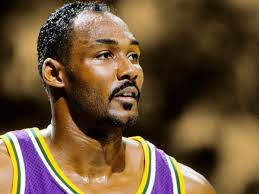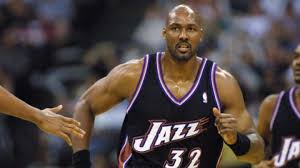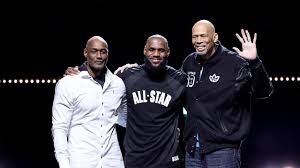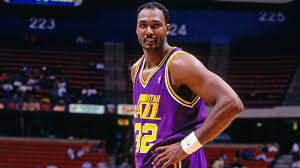Table of Contents
ToggleKarl Malone, famously known as “The Mailman,” stands as one of the greatest power forwards in NBA history. His dominance on the court, remarkable consistency, and work ethic left an indelible mark on the sport. Born on July 24, 1963, in Summerfield, Louisiana, Malone’s journey from humble beginnings to basketball stardom serves as an inspiring tale of perseverance and dedication.
Early Life and Introduction to Basketball

Karl Malone grew up in a small town in Louisiana, the youngest of nine children in a single-parent household. Raised by his mother, Shirley, Malone learned the values of hard work and discipline from a young age. His rural upbringing involved chores on the family farm, instilling a strong sense of responsibility.
Basketball became an outlet for the young Malone during his high school years at Summerfield High School. Standing out for his size, strength, and athleticism, he led his team to three consecutive state championships. His high school success earned him a scholarship to Louisiana Tech University, where he would continue to refine his skills.
College Career and NBA Draft
At Louisiana Tech, Karl Malone quickly established himself as a dominant force on the court. He averaged 18.7 points and 9.3 rebounds per game during his college career and helped the team achieve its first-ever NCAA Tournament appearance in 1984. His performance drew attention from NBA scouts, and he declared for the NBA Draft after his junior year.
In the 1985 NBA Draft, Malone was selected as the 13th overall pick by the Utah Jazz. While many questioned his potential at the professional level, Malone was determined to prove himself. The Jazz would soon realize they had acquired a cornerstone player for their franchise.
Dominance with the Utah Jazz
Karl Malone spent the majority of his NBA career with the Utah Jazz, forming one of the most iconic duos in basketball history with point guard John Stockton. Together, they mastered the pick-and-roll offense, a strategy that became nearly unstoppable during their time on the court.
Karl Malone ability to score in the post, combined with his mid-range shooting and physicality, made him a nightmare for defenders. He averaged over 20 points per game for 17 consecutive seasons, showcasing his remarkable consistency. By the end of his career, he had accumulated 36,928 points, ranking him second on the NBA’s all-time scoring list, behind Kareem Abdul-Jabbar.
The Jazz, led by Malone and Stockton, reached the NBA Finals in 1997 and 1998. Despite their best efforts, they fell short both times, losing to Michael Jordan and the Chicago Bulls. While a championship eluded Malone, his individual accolades solidified his place among the greats.
Playing Style and Impact on the Game

Karl Malone was renowned for his physicality and versatility. Standing at 6’9″ and weighing 250 pounds, he combined strength and agility to dominate opponents in the paint. His relentless work ethic and fitness allowed him to sustain a high level of performance throughout his career.
Offensively, Karl Malone excelled in various aspects of the game. He could post up smaller defenders, knock down mid-range jump shots, and finish fast breaks with authority. Defensively, he was a strong rebounder and an underrated shot-blocker, contributing significantly to his team’s success on both ends of the floor.
Malone’s discipline extended beyond the court. He was known for his rigorous training regimen and commitment to maintaining peak physical condition. This dedication not only prolonged his career but also set an example for younger players aspiring to reach the highest level of competition.
Transition to the Los Angeles Lakers
In 2003, Karl Malone signed with the Los Angeles Lakers, joining forces with Shaquille O’Neal, Kobe Bryant, and Gary Payton in a bid to capture an elusive NBA championship. The Lakers reached the NBA Finals that season but were defeated by the Detroit Pistons in five games. Malone’s final season was marred by injuries, and he announced his retirement in 2004.
Despite falling short of a championship, Malone’s contributions to the Lakers highlighted his willingness to adapt and play a complementary role in pursuit of team success.
Life After Basketball
Following his retirement, Karl Malone shifted his focus to personal mancingduit interests and community involvement. He returned to Louisiana and invested in various businesses, including car dealerships and restaurants. Malone also became a prominent figure in his hometown, contributing to charitable causes and mentoring young athletes.
In addition to his business ventures, Malone occasionally worked as an NBA analyst and assistant coach. His insights and experience brought a valuable perspective to the next generation of players, further solidifying his legacy within the basketball community.
Recognition and Legacy

Karl Malone’s impact on basketball extends far beyond his on-court achievements. He was a 14-time NBA All-Star, two-time NBA Most Valuable Player (MVP), and 11-time All-NBA First Team selection. His relentless drive and unmatched consistency earned him a spot in the Naismith Memorial Basketball Hall of Fame in 2010.
Beyond the statistics and accolades, Malone’s legacy is defined by his work ethic and dedication to the sport. He inspired countless players to embrace the grind and strive for excellence, embodying the values of perseverance and determination.
Controversies and Public Perception
While Karl Malone’s basketball career was widely celebrated, his personal life occasionally drew criticism. Controversies surrounding his relationships and decisions off the court have sparked debate among fans and analysts. Despite these challenges, Malone remains respected for his contributions to the game and his community.
Conclusion
Karl Malone’s journey from a small-town boy in Louisiana to an NBA legend exemplifies the power of hard work and determination. As one of the greatest power forwards in basketball history, he left an indelible mark on the sport through his scoring prowess, physicality, and unwavering commitment to excellence.
While the lack of an NBA championship may linger as a “what if,” Malone’s legacy is firmly cemented among the game’s all-time greats. The Mailman delivered time and again, proving that success is about more than just trophies—it’s about the impact you leave behind.

